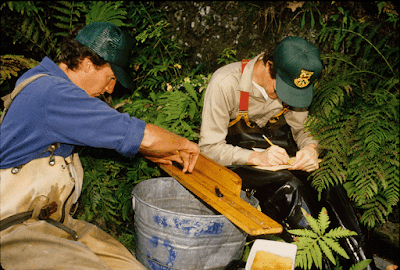
The American Fisheries Society recently awarded the 2017 Sport Fish Restoration Outstanding Project Award to the Vermont Fish & Wildlife Department for the project entitled “Evaluation of Wild Brook Trout Populations in Vermont Streams.”
According to AFS, this national award “both highlights the importance and effectiveness of the Sport Fish Restoration program and recognizes excellence in fisheries management, research, and education” and was given in recognition of the innovative nature of the study, as well as its novel findings.
In this decade-long study, Rich Kirn, fisheries program manager, and his colleagues repeated a historic statewide survey, conducted in the 1950s by former VFWD biologist Jim MacMartin, to determine how wild brook trout populations in Vermont fared during a period spanning several decades. Kirn and other fisheries staff sampled brook trout populations from streams across the state. They found that compared with the 1950s young-of-year brook trout are more abundant today, adult brook trout are as abundant today as they were 50 to 60 years ago, and the impacts of nonnative trout on brook trout have been negligible to nonexistent in these streams. These combined results indicate that brook trout populations are presently robust and secure within Vermont.
“It’s gratifying to see the Department receive this recognition,” said Eric Palmer, director of Fisheries, “Rich has spent decades protecting and improving fish habitat in the state. His team’s current research demonstrates that our environmental protections and fisheries management practices have benefited brook trout throughout Vermont.”
This outcome is especially noteworthy because brook trout have been declining in other parts of the country. The program’s study indicates that Vermont’s brook trout are faring much better.
“Vermont’s wild brook trout populations depend on the health of their habitat,” said Kirn. “State, federal and private natural resource organizations, as well as Vermont landowners can help to keep brook trout populations strong. Maintaining riparian zones of trees and other vegetation along streambanks will provide shade, food and cover, as well as stabilize streambanks and filter pollutants. All of us can contribute to ensure our native trout thrives for another 60 years.”
To receive a copy of the complete survey report, “Evaluation of Wild Brook Trout Populations in Vermont Streams,” please contact Rich Kirn at rich.kirn@vermont.gov.
-30-
Caption for attached Vermont Fish & Wildlife photo: Rich Kirn and Rod Wentworth, fisheries biologists with Vermont Fish & Wildlife, prepare to examine trout from the Dog River. The Department recently was awarded the 2017 Sport Fish Restoration Outstanding Project Award by the American Fish Society. (Photo: John Hall, VFWD).
